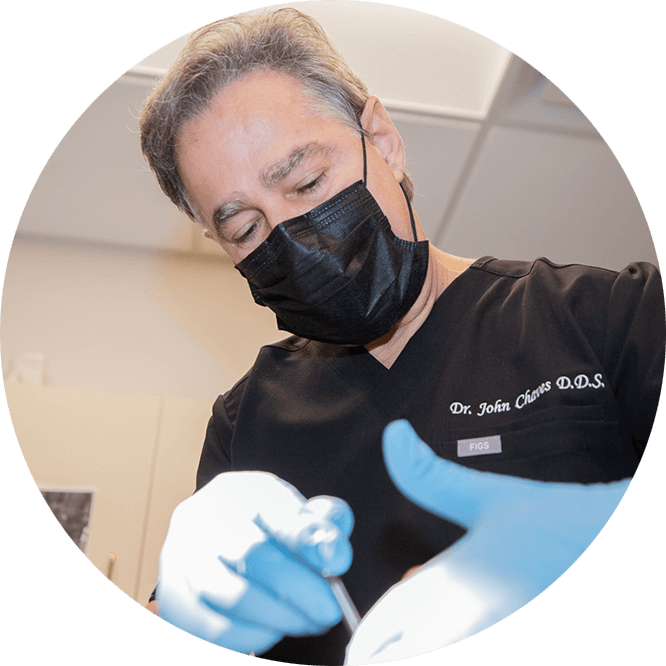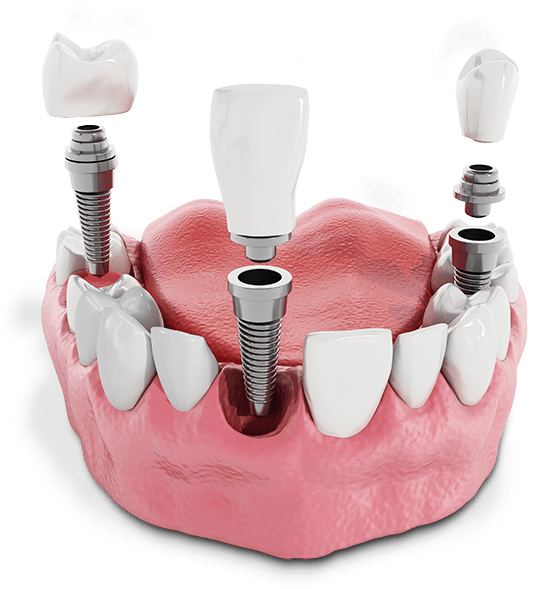


Are you ready to transform your smile by replacing your missing teeth? At John M. Chaves, DDS, our Woodland Hills dentist has helped countless patients achieve their smooth goals! And the best part? You don’t have to settle for dentures and deal with restricted eating and daily maintenance. Dr. Chaves offers dental implants—your life-changing dental treatment!
There are multiple dental implant treatment options available with endosteal implants, including implant-supported dentures, single-tooth replacements, and more.
Call our Woodland Hills dentist today at 818-491-7294 to find out more about the implant treatments we offer at our dental practice.
Endosteal dental implants are tooth restorations placed directly in the jawbone. Typically made of titanium, they’re the most common type of implant used for replacing teeth. Endosteal implants mimic the shape of a natural tooth root as they’re placed into the jaw, creating a secure foundation for a permanent restoration, such as a dental crown, to be placed on top of the titanium implant.
An endosteal implant provides various advantages, including:


Endosteal implants work by replacing the missing tooth root. During the endosteal implant procedure, a small titanium post is surgically placed into the jawbone by an oral surgeon. The implant is left to heal and fuse with the bone, a natural process known as osseointegration. Once the implant has fused with the jawbone, the dental surgeon attaches an artificial tooth to the metal post. While the entire procedure is completed in one visit, the recovery period varies between three and six months.
Your candidacy for endosteal dental implants can be determined by your oral surgeon or dentist. To be a good candidate for endosteal implants, you need adequate jawbone density and must be in good overall health. Patients with chronic illnesses, such as diabetes, or those who smoke or use tobacco products may not be candidates, as it increases their chances of implant failure.
Endosteal dental implants aren’t recommended for patients with severe bone loss. For those specific cases, our dentist may consider other tooth replacement options or a supplemental procedure, such as bone grafting or a sinus lift.
Ideal candidates for endosteal implants meet the following criteria:

While an endosteal implant is the most popular type, there are other alternative implants and tooth replacement options. A dental professional may recommend any of the following alternatives:
To determine the best tooth replacement option, your dentist or oral surgeon will evaluate your dental health and discuss your smile goals. If you’re in Woodland Hills, contact our dentist today to schedule your implant consultation.
Per implant, patients can expect to pay between $1,000 and $4,000. However, the total price will vary depending on factors such as how many implants are needed, the need for supplemental procedures, your dentist’s experience, and the location of the dental practice.

Applying for financing is fast and easy and provides you with a monthly payment plan that fits your budget.
While the surgical procedure for endosteal dental implants only takes one visit to the dentist, the entire endosteal implant process typically takes several months to complete. Patients can expect the entire treatment to last between three and nine months. However, some patients may need to undergo additional surgery, such as bone augmentation, to create the solid base needed for the implant body.
Endosteal dental implant surgery typically causes minimal pain, as only a small incision is needed. The procedure is also usually done with some type of dental sedation. After the procedure, patients may experience some discomfort and swelling, but they can manage this discomfort with over-the-counter pain medications and cold compresses.
Endosteal dental implants can last a lifetime with proper aftercare and oral hygiene. To increase their longevity, make sure you’re maintaining good oral hygiene, visiting the dentist for regular dental check-ups, and avoiding habits such as smoking or grinding your teeth.
Endosteal dental implants are a highly effective and long-lasting solution for replacing missing teeth. Not only do they look and function like natural teeth, but they also help preserve the integrity of the jawbone and prevent surrounding teeth from shifting.
To learn more about our treatments, get in touch with our Woodland Hills dentist today by calling 818-491-7294.


I understand the information disclosed in this form may be subject to re-disclosure and may no longer be protected by HIPAA privacy regulations and the HITECH Act.
